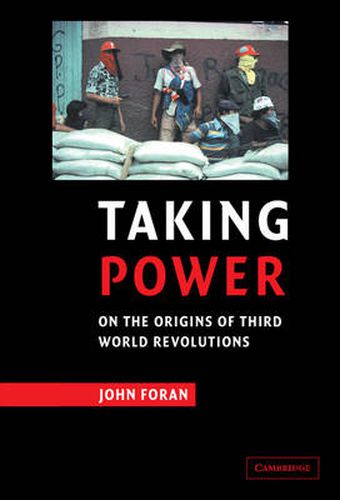Readings Newsletter
Become a Readings Member to make your shopping experience even easier.
Sign in or sign up for free!
You’re not far away from qualifying for FREE standard shipping within Australia
You’ve qualified for FREE standard shipping within Australia
The cart is loading…






Taking Power analyzes the causes behind some three dozen revolutions in the Third World between 1910 and the present. It advances a new theory that seeks to integrate the political, economic, and cultural factors that brought these revolutions about, and links structural theorizing with original ideas on culture and agency. It attempts to explain why so few revolutions have succeeded, while so many have failed. The book is divided into chapters that treat particular sets of revolutions including the great social revolutions of Mexico 1910, China 1949, Cuba 1959, Iran 1979, and Nicaragua 1979, the anticolonial revolutions in Algeria, Vietnam, Angola, Mozambique, and Zimbabwe from the 1940s to the 1970s, and the failed revolutionary attempts in El Salvador, Peru, and elsewhere. It closes with speculation about the future of revolutions in an age of globalization, with special attention to Chiapas, the post-September 11 world, and the global justice movement.
$9.00 standard shipping within Australia
FREE standard shipping within Australia for orders over $100.00
Express & International shipping calculated at checkout
Taking Power analyzes the causes behind some three dozen revolutions in the Third World between 1910 and the present. It advances a new theory that seeks to integrate the political, economic, and cultural factors that brought these revolutions about, and links structural theorizing with original ideas on culture and agency. It attempts to explain why so few revolutions have succeeded, while so many have failed. The book is divided into chapters that treat particular sets of revolutions including the great social revolutions of Mexico 1910, China 1949, Cuba 1959, Iran 1979, and Nicaragua 1979, the anticolonial revolutions in Algeria, Vietnam, Angola, Mozambique, and Zimbabwe from the 1940s to the 1970s, and the failed revolutionary attempts in El Salvador, Peru, and elsewhere. It closes with speculation about the future of revolutions in an age of globalization, with special attention to Chiapas, the post-September 11 world, and the global justice movement.